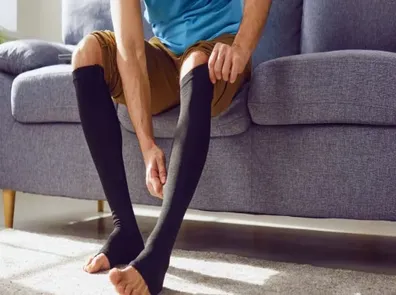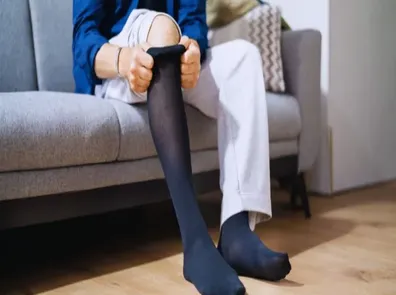Although compression socks may seem like a simple accessory, they play a significant role in boosting health. Designed to enhance blood flow, reduce swelling, and support the legs, compression socks are beneficial for everyone, not just athletes or medical professionals. Whether your daily mobility is limited, you travel frequently, or you’re recovering after exercise, these socks can make a difference.
Compression socks improve mobility, alleviate discomfort, and help reduce the risk of various medical conditions, including varicose veins and blood clots. This guide will explore how compression socks contribute to better health and well-being. From their practical benefits to tips on choosing the right pair, you’ll discover how this simple addition to your wardrobe can enhance your daily comfort and overall health.

Types of Compression Socks
There are various types of compression socks, each designed for specific needs:
- Graduated Compression Socks: These socks provide the most pressure at the ankle and gradually decrease up the leg. This design ensures proper blood flow back to the heart, making them suitable for pregnant women, office workers, and athletes.
- Anti-Fatigue Compression Socks: Ideal for medical professionals who stand for long periods, these socks stabilize leg muscles and reduce fatigue.
- Medical-Grade Compression Socks: Prescribed for individuals with health issues like DVT or varicose veins, these socks offer higher pressure and are often recommended by doctors for optimal support.
- Casual Compression Socks: Designed for everyday comfort and wear, these socks offer circulation benefits and support, though they are less robust than medical-grade options.
How Do Compression Socks Benefit Health?
Here are the various ways compression socks can enhance health, improve comfort, and support overall well-being in daily life.
Enhanced Blood Circulation
One of the primary benefits of compression socks is improved blood circulation. Blood circulates continuously throughout your body, but it can sometimes pool in your legs, causing discomfort. Compression socks apply gentle pressure, encouraging blood to flow upwards towards the heart. This is particularly beneficial for those who sit or stand for long periods. Improved circulation reduces the risk of deep vein thrombosis (DVT) and blood clots, ensuring your muscles receive the necessary oxygen and nutrients.
Reduced Swelling and Edema
Swelling and edema are common issues, particularly for individuals who spend long hours on their feet. Compression socks help reduce swelling by applying consistent pressure to your legs, preventing excess fluid buildup in tissues. This is beneficial for professionals who work on their feet all day, such as retail workers or nurses, as well as pregnant women and athletes who want to minimize post-exercise swelling.
Prevention of Varicose Veins
Varicose veins are swollen, twisted veins that often appear on the legs due to poor circulation and weak vein walls. Compression socks can help prevent these veins from forming by ensuring adequate blood flow and reducing vein pressure. Regular use of compression socks can help keep your legs free from unsightly and often painful veins, especially for those with a family history of varicose veins.

Enhanced Athletic Performance and Recovery
Athletes often use compression socks to aid recovery and enhance performance. By increasing blood flow to the legs and supporting the calf muscles, these socks reduce muscle soreness and fatigue. They also help speed up recovery by clearing lactic acid buildup in muscles, allowing athletes to train harder and recover faster. Compression socks can give you a competitive edge in running, cycling, or any other sport.
Pain Relief and Muscle Support
Compression socks can provide relief from leg pain by applying gentle pressure that supports joints and muscles. This helps alleviate aches and pains associated with running or prolonged standing. Additionally, compression socks offer stability, helping to prevent injuries. Many seniors use these socks to manage joint stiffness and arthritis pain, providing comfortable support to reduce strain on legs and feet.
Reduced Risk of Blood Clots
Blood clots are serious health concerns that can form in the veins of the legs. They can lead to deep vein thrombosis (DVT), posing significant health risks. Compression socks help prevent blood clots by promoting proper blood flow, preventing blood from pooling in the veins, and reducing the risk of clot formation. This is especially important for individuals on long flights or those who sit for extended periods, such as office workers.
Support for Expecting Mothers
Pregnant women often experience leg swelling and discomfort due to increased pressure on veins from the growing uterus. Compression socks improve circulation, reducing vein pressure and preventing varicose veins and swelling. They provide essential support during pregnancy, helping expectant mothers feel more comfortable and reducing leg discomfort and fatigue.
Long-Term Health Benefits
Wearing compression socks regularly can help maintain long-term health by supporting vein health, reducing the risk of chronic venous diseases, and preventing serious conditions like varicose veins and DVT. Regular use also improves overall leg function and mobility. With better circulation and reduced swelling, your legs remain stronger and healthier, leading to fewer doctor visits and medical expenses. As you age, wearing compression socks ensures better mobility and general well-being.
Conclusion:
Compression socks are more than just a piece of clothing; they offer significant health benefits across various applications. From improving blood circulation to reducing swelling and supporting vein health, these socks enhance comfort and mobility. They are invaluable for athletes, pregnant women, and anyone with extended sitting or standing routines. By wearing compression socks regularly, you can prevent varicose veins, reduce the risk of blood clots, and support long-term leg health. Strong muscles and veins help ensure better well-being as you age. Incorporating compression socks into your daily routine is a simple step toward a healthier and more comfortable life.